Today’s post is for those of you who are fans of the Aria Frequency Lists, my annual autumn accounting of the popularity of various audition arias. Our audition application website captures singers’ arias lists (or “packages”) in a way that allows us to churn out this data every year. (For those of you who wonder why we don’t use Yap Tracker: this is one of the reasons.)
Curl up with some hot chocolate. This will take a while.
Lists on the left of the graphics reflect the frequency with which singers included arias in their 4-aria “package.” Lists on the right show how often certain arias were offered as first choices in the audition room.
SOPRANOS
Mozart
- Pamina was listed by 22% of singers but didn’t show up a single time as a first choice. She’s probably in audition packages because she fills a common German requirement for light lyrics. Wisely, ladies rarely open with this aria, which is deceptively difficult to sing well.
- Blondchen isn’t listed frequently because she’s a special case, with that freaky high E; but many of the sopranos who list her make a point of starting with her, so she shows up fairly frequently.
- Susanna makes a strong showing on both lists, predictably.
English
- Anne Trulove and Susannah are near the top of the package list, most likely to fulfill a common English aria requirement.
- Anne is rarely offered first – most likely due to length. It’s wise not to start with the whole scene, butI really think that sopranos shouldn’t hesitate to offer “Quietly, Night” or “I Go to Him” as stand-alone arias if they want to.
- As for Susannah, she is usually an afterthought, not often what lyrics choose to lead with.
Verdi, Rossini, Donizetti
- Gilda is thankfully not offered as often as she is listed. “Caro nome” requires real stylistic maturity, and that’s rare in a 20-something. (On the other hand, Bellini’s Giulietta shows up more often than she should… O quante volte must I hear this aria sung blandly…?)
- Violetta isn’t listed by (or sung by) a lot of sopranos, but the ladies who use it tend to open with it. With varying results, as you might suspect. Proceed with caution.
French
- Manon makes frequent appearances, but she doesn’t seem to be as ubiquitous as in recent seasons.
- Micaela and Juliette are listed a lot but were rarely used as audition openers. Not sure why Juliette doesn’t appear more often.
- Marguerite held her own in the middle of the pack; a nice trend, as that aria seemed to have fallen out of favor for a while, and it’s quite useful and effective in audition.
MEZZOS
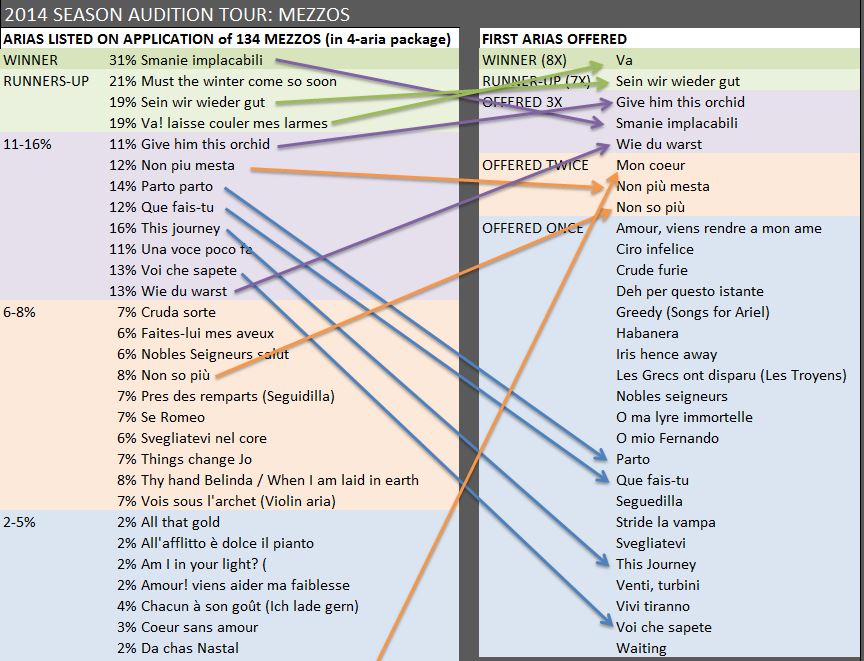
Observations…
English
- Erika’s “Must the Winter” is inescapable in audition packages (due to a common English aria requirement for sure), but she wasn’t offered as a first choice once. Not once. Can’t say I object. Although we did default to Erika a few times when the first aria offered gave us few clues about legato.
- Lucretia is more and more popular. But be careful, ladies: you need real contralto guts for “Give him this orchid,” and you need to sing (not scream) the introductory scene.
French
- “Va” is ubiquitous. And we’re not complaining. In our context, Charlotte is a defensible way for mezzos to spend their first two minutes in the audition room. Lets us wrap our minds around the sound in fairly quickly and guarantees a substantial second aria choice.
- Dalila was only listed by a few mezzos (she’s a fairly mature sing for young artists), but most of the ladies who sing her made a point of offering her first.
- In recent years, Stephano has almost completely eclipsed Siebel.
German
- Few mezzos can sing the Composer well. And he is offered far more frequently than he should be. It’s probably a personal bias, but I find that most of the time I learn more about your liabilities than your assets in this short opener.
Italian
- Cherubino has generally deserted us. He used to surface regularly, but not so much any more. Don’t really know what to make of this. If I had to draw conclusions, I think that he gets short shrift because his arias don’t win competitions.
TENORS
Mozart
- Tamino is the Mozart aria nearest the top of both lists, although he’s referenced in packages far more often than he’s actually proffered. What’s surprising is that Ferrando surfaced more frequently than Ottavio. Don’t know that I can read too much into this, though.
English
- Tom Rakewell, Sam from Street Scene and Bolcom’s “New York Lights” are the top English arias offered (actually, crazily, in 3 of the top 4 spots), but the Male Chorus from Britten’s Lucretia beat both of them to the audition room. I think this just means that for the guys who sing the Britten, they trust that aria to show off their stuff more than the more lyric voices who sing Tom, Sam and Rodolpho.
Italian/French
- The Duke’s “Questa o quella” is the tenor’s version of “Va”: feel out the room, easy your way into a Bb, and only use up a few minutes.
- Ramiro’s aria is listed far more frequently than it’s sung: I think that many of the guys who sing him also sing Tonio, and they are far more likely to open with “Ah mes amis.”
- Jose and Roméo were frequently listed but never offered (until we asked for them:))
BARITONES
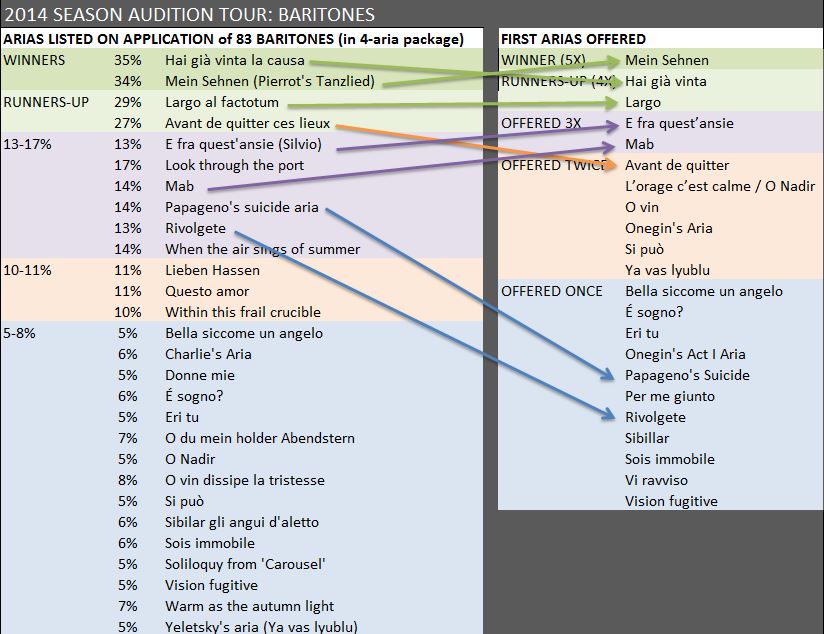
Observations…
Italian
- The Count and Figaro lead the pack both in the listings and the offerings. For good reasons.
- Silvio is the go-to for lyric baritones.
German
- Pierrot’s Tanzlied is consistently popular, but rarely shows guys in the best light. (See Mezzos: Composer) I know that the German aria is a tough decision, and many of you wisely wait to attack Wolfram. Harlekin, while short and sweet, telegraphs little, and Papageno’s “Suicide” scene is more of a character exercise in the audition room. But for programs without a German language requirement, you might want to think twice about starting with this one.
French
- Valentin and Mercutio are reliable and frequent choices, for lyric and light lyric voices respectively. And of course, they serve different dramatic and stylistic purposes within the large context the the audition package.
English
- Billy Budd and Horace Tabor show up on lists, but not a single baritone chose to open with an English aria.
- Charlie’s aria from Three Decembers is increasingly common on lists.
BASSES & BASS-BARITONES
Mozart
- Leporello is the hands-down winner in audition packages, but no one opened with him. I get it. Too long.
- Figaro still makes appearances with “Se vuol ballare,” but I miss “Aprite.” And “Non più andrai” for that matter.
- Nobody sings Sarastro. Don’t know what that means.
Italian
- The “Lacerato spirito” bass national anthem wasn’t listed by the majority of basses, but as a start, it took first place. If you have the F# and the gravitas for this, then go for it. But if you’re more of a basso cantante, and your bass extension is still a work in progress, I’m not sure this is the best course.
- Banquo’s is the most common Verdi aria included on lists, but it doesn’t make it into the room often.
END NOTES
Although in some ways, a month-long audition tour can feel like the Groundhog Day movie, there is far more variety than you might think. Yes, there is repetition, most of it necessary. But this fall we heard 326 different arias from our Filene Young Artist applicants. That’s astonishing. Music from four centuries, in seven languages, from hundreds of singers. Comedy, tragedy, beauty, drama. If you’re one of the people who make the music, thank you. If you’re back at Wolf Trap waiting for the fruits of our audition labors, never fear. This was a beautifully strong showing, and we’re culling a fascinating season from a handful of the best singers we heard. Details coming in 2014.
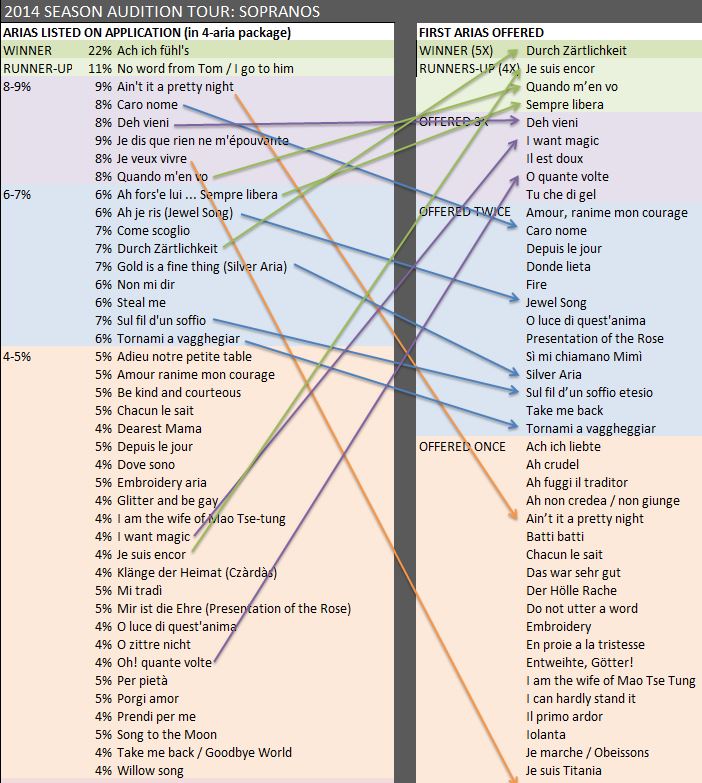
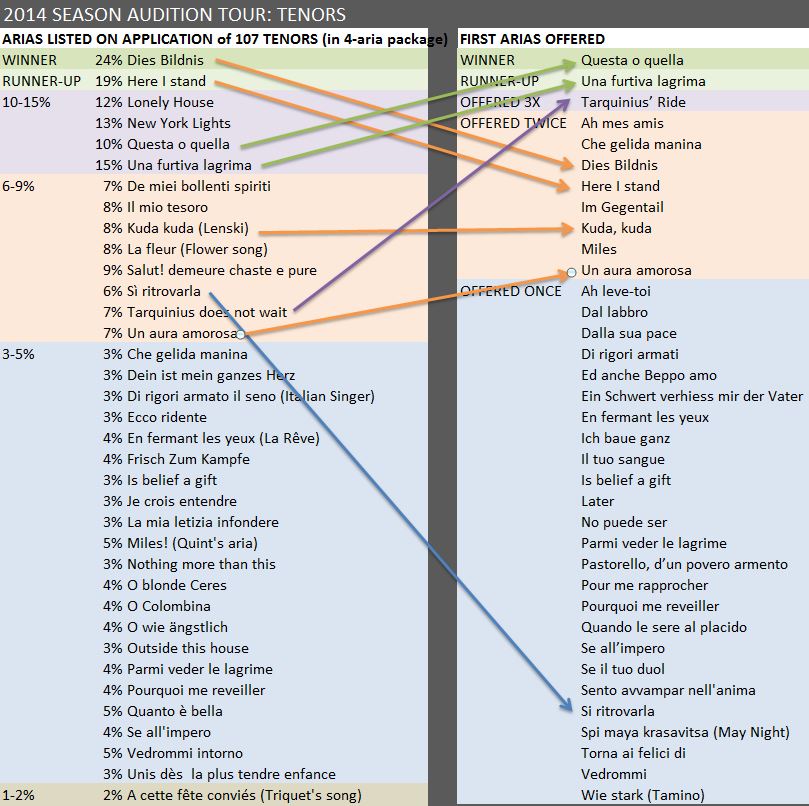
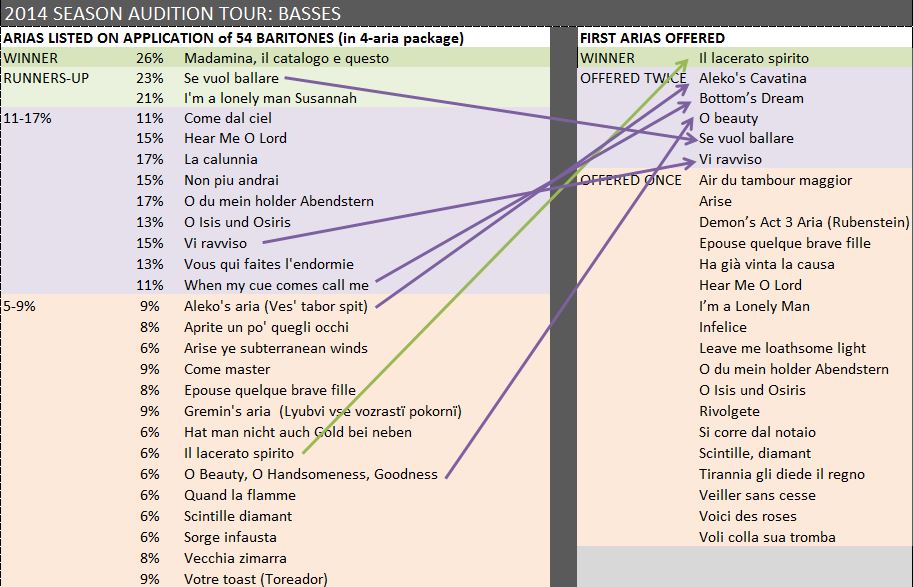
What opera is “Va” from?
Any arias by Johann A. Hasse? He seems to be getting more popular (at least with countertenors).
http://www.amazon.com/Hasse-Siroe-Max-Emanuel-Cencic/dp/B00NMXE6MA/ref=sr_1_1?ie=UTF8&qid=1417705928&sr=8-1&keywords=Hasse
http://www.amazon.com/Hasse-Reloaded-Valer-Barna-Sabadus/dp/B006O8K4P8/ref=sr_1_3?ie=UTF8&qid=1417705928&sr=8-3&keywords=Hasse
http://www.amazon.com/Hasse-Marc-Antonio-e-Cleopatra/dp/B003T68VPS/ref=sr_1_2?ie=UTF8&qid=1417705928&sr=8-2&keywords=Hasse
http://www.amazon.com/Hasse-Didone-abbandonata-Johann-Adolf/dp/B00ARL9QD4/ref=sr_1_11?ie=UTF8&qid=1417705982&sr=8-11&keywords=Johann+Hasse
http://www.amazon.com/Rokoko-Hasse-Max-Emanuel-Cencic/dp/B00GNO2XV6/ref=sr_1_3?s=music&ie=UTF8&qid=1417706017&sr=1-3
http://www.amazon.com/Arias-Caffarelli-Johann-Adolf-Hasse/dp/B00D1QBQ2G/ref=sr_1_4?s=music&ie=UTF8&qid=1417706069&sr=1-4
That’s “Va, laiise couler mes larmes” from Massenet’s WERTHER. Nothing by Hasse showing up yet!